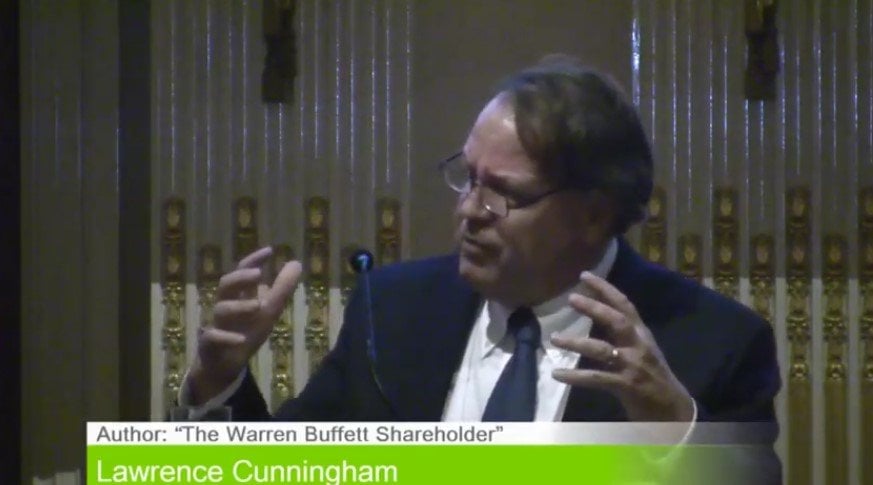The Museum of American Finance and the Fordham University Gabelli Center for Global Security Analysis host an evening with Warren Buffett’s writer and editor of choice, Lawrence Cunningham, on his new book about what makes Buffett’s shareholders tick and what happens at the Berkshire annual meeting.
Q2 hedge fund letters, conference, scoops etc
In this engaging collection of stories, 43 veterans of the Berkshire Hathaway Annual Meeting explain why throngs attend year after year. Beyond the highlights of Warren's wisdom displayed on stage in his day-long Q&A with Vice Chairman Charlie Munger, these experts reveal the Berkshire meeting as a community gathering of fun, fellowship and learning.
Lawrence Cunningham (Part 1): The Warren Buffett Shareholder
Lawrence Cunningham (Part 2): Inside the Berkshire Annual Meeting
Transcript
Warren quips I should put the quote up there that you get the shareholders you deserve.
Good bad or ugly. Bircher has invested enormously over five decades in getting a very high quality group of shareholders who understand this culture that shareholder is long term. It's OK with a diversified acquisitive model. And all the other peculiar features of Berkshire. It's a very unusual company it's a very unusual group of shareholders. Let me count the ways. First of all the ways that Berkshire shares are unusual. First of all they are most mostly individuals. At most companies in corporate America the equity is owned by institutions. Three quarters of the equity of public of large public companies owned by institutions and only twenty five percent by individuals at Berkshire it's almost the other way around. When you count Warren's stake even without counting Warren stake 40 percent of Berkshire. Both the voting power and economic interest is owned by individuals making institutional investors of Berkshire less important. At most big companies today financial giants like these owned large blocks that together dominate 60 70 or something like that percent. But at Berkshire they only control about 10 percent of the vote and 15 percent of the economic interest only Warren owns more than 5 percent. Of the premium class a stock. Fidelity comes close at 4 percent on the Class B there are three giants that own more than 5 percent. But because the Class B has lower board voting rights they only have three and a half percent of the vote and their investment rationale is formulaic. They're not fully engaged investors they own they run index funds and so they have the top three. Their Fidelity Vanguard I mean Vanguard BlackRock and State Street. They have two in the Class B unlike in most large American companies. Berkshire has a very visible and substantial group of institutional investors who are petite boutique firms who've owned Berkshire for decades have very long time horizons and often cater to families together. This cohort owns about seven and a half percent of the vote 5 percent of the economic interest these are famous firms. The top three there have owned large chunks of Berkshire for since 1970. And the next three or four have owned large chunks of Berkshire since the 1980s. And many of the principals in these firms contributed to our book.
Berkshire also boasts very high insider ownership and has done since the 1980s is that the fund picture the board of directors having what is. What are they drinking stuff. Those are milkshakes I thought a Dairy Queen something or other but they're just old milkshakes. But look at what fun they're having. And it's not just because they own the stock it's really fun to work at Berkshire again not counting war and these guys have nearly 5 percent of the vote and 5 percent of the economic interest. Several of these people have interests that run to billions of dollars. Most Berkshire managers have significant portions of their net worth in Berkshire stock which runs to millions.
Are there important families that are Berkshire owners including numerous members of many of the families who sold their interest in Berkshire over the years whether it's small and a small number of cases receiving stock in the sale but in a lot of cases taking the cash proceeds and buying the stock. A lot of this is that a tax question is under appreciated but vital about Berkshire shareholders. Most capital in the United States is controlled by institutions whose performance is measured pre-tax or who are tax exempt like foundations and pension funds and so that.
About the Museum of American Finance:
The Museum of American Finance, an affiliate of the Smithsonian Institution, is the nation’s only independent museum dedicated to preserving, exhibiting and teaching about American finance and financial history. With its extensive collection of financial documents and objects, its seminars and educational programming, its publication and oral history program, the Museum portrays the breadth and richness of American financial history, achievement and practices. For more information, visit www.moaf.org or connect with the Museum on Facebook or Twitter.






